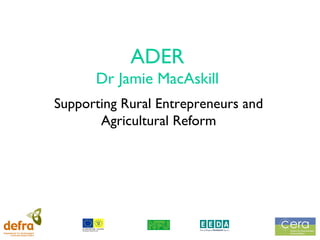Dealing with fractured markets
- 1. ADER Dr Jamie MacAskill Supporting Rural Entrepreneurs and Agricultural Reform
- 2. ADER The ADER (Agricultural Development in the Eastern Region) project is a region - wide agricultural support project started in 2000 It is focused on helping farmers to address the economic and environmental pressures they are facing
- 3. Drivers Initial research highlighted a stagnating rural economy and a real chance of 8000 farmers going bankrupt In 2000 the exchange rate with Euro severely depressed farm gate prices CAP reform First Rural Development Programme was launched in England
- 4. Issues Farm businesses focused on production agriculture dominated by government and CAP policies Absence of practical and cost effective support for small or micro businesses made change uncomfortable High costs of entry to assistance Plethora of business support services tended to confuse, the team stopped counting after 78 in one county and 100 in another
- 5. Challenges Need to modernise Diversify Develop new income sources Poor profitability Lack of investment capital New skills for new businesses Existing business support services failed to deliver business training, technical advice and support services in a co-ordinated way
- 6. Opportunities Writtle advisers working on the RDA¡¯s Rural White paper Policy abyss between Rural White paper proposals and actual support for diversification on the ground RDA keen to preserve skills in the rural economy and farm business diversification The six land based colleges were ready to co-operate to re-connect with the industry
- 7. Solution Coordinate actions between all public sector providers working in agriculture [ core ] Change the culture of the support providers to make them more market led [ subtext ] Make a real difference to businesses by providing a single route into a mix of training, education and business support enabling rurally based businesses to progress
- 8. Strategy Short term to focus on skills development and launch into delivery immediate rather than negotiating the partnerships Long term to develop a region wide support service to support the transition in the agricultural economy which was required Complement and fill gaps in delivery and join up supply with demand
- 9. Consortium 4 key partners: Farming organisations Agricultural Colleges Government agencies and FARMERS themselves 2 original initiatives: Information Technology (IT) training Farm diversification support
- 10. Delivery 6 County officers, one in each county based in a college A central office facility in Cambridge An executive board run by the College¡¯s A steering group including all stakeholders including the funding agencies
- 11. Programme By 2005 over 4000 farmers have been help ed to: assess diversification options; develop a business plan and a bid for grant aid The support programme is delivered by: a series of workshops & seminars; visits to diversified farms; one to one on farm business support
- 12. Partnership Overcoming complexity Overcoming rivalry Developing trust chains Sustainable personnel changes Secured ?4.2 million over 5 years Extended partnership
- 13. Lessons learnt 96% satisfaction Farmer engagement Used farmers themselves to help Used national farmer organisations to help Small business people need a package tailored to them Spouses important in development process Farmer needs change quickly Business people dislike traditional teaching locations It is possible to knock down silos Need champions It takes time, there is a time value to spend
- 14. Future Further ?1.7 million secured to deliver: Rural Gateway Formal joining of the regional Business Links with ADER to provide a seamless diagnostic, brokerage and delivery partnership to create the Rural Business Development Service If a business thinks its rural then it can benefit from the service, no longer just about agricultural reform Further improvements in access to provision
- 15. Thank you Dr Jamie MacAskill







![Solution Coordinate actions between all public sector providers working in agriculture [ core ] Change the culture of the support providers to make them more market led [ subtext ] Make a real difference to businesses by providing a single route into a mix of training, education and business support enabling rurally based businesses to progress](https://image.slidesharecdn.com/adereversion-12745329145705-phpapp02/85/Dealing-with-fractured-markets-7-320.jpg)







